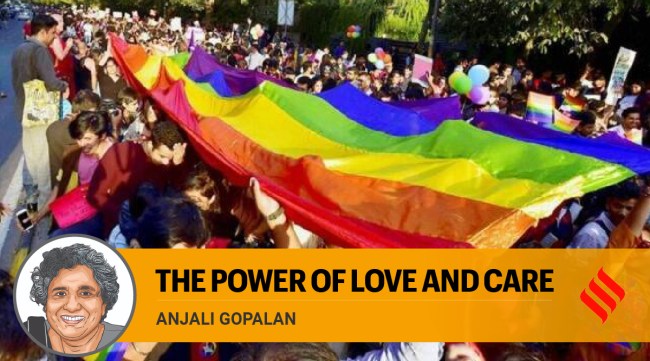Opinion India@75, Looking at 100 | Anjali Gopalan writes: Equality and justice, for and beyond queer and trans community
Anjali Gopalan writes: We need people-first interventions and the foregrounding of values like empathy and love in society
 Anjali Gopalan writes: The power of love and care, as witnessed in the 2009 and 2018 judgments, is the best cure for dysfunction and deprivation. (Express/File)
Anjali Gopalan writes: The power of love and care, as witnessed in the 2009 and 2018 judgments, is the best cure for dysfunction and deprivation. (Express/File) In 1995, I set up the Naz Foundation in India to work with HIV/AIDS patients — providing information, resources, housing, healthcare, training, sensitisation programmes, etc. We launched a programme to provide medical care and counselling to transgender persons and men, and expanded to include women and children. A fundamental challenge was a lack of care for patients. Having worked with HIV/AIDS patients at the peak of the epidemic in the US, I learnt a few lessons.
One, addressing stigma was critical. Two, it is impossible to protect yourself without valuing yourself. Working in India meant retraining myself and finding appropriate and effective ways to dispense care. Patients would often say heartbreaking things: “Is there a medicine that can cure me?” Almost three decades later, we have been able to reach out to and help thousands.
In 2001, one of the men I gave family counselling to came to me shattered. His family had him admitted to a major hospital in New Delhi, where he was put through “conversion therapy”. Medical professionals administered shock treatment to him. When we approached the National Human Rights Commission, we were turned away because homosexuality was a criminal act. That was the final nail in the coffin. We challenged Section 377 of the IPC in the Delhi High Court (HC). From there began a long-drawn battle.
In Naz Foundation v Govt of NCT (2009), the Delhi HC held that treating consensual homosexual sex between adults as a criminal act violates fundamental rights guaranteed by the Constitution. This was a watershed moment for the queer community. Hundreds came out of the closet, shed their shame, and find community. Consequently, they found the care that they were long deprived of. The space this judgment created led to the reading down of Section 377 by the Supreme Court on September 6, 2018. The petitioners in the case were gay, and finally bold enough to fight this constitutional violation.
In the 75 years of independent India, progress has been slow but sure to come. Today, the government is proactive in HIV/AIDS sensitisation. The National AIDS Programme has been a crucial step forward. It allows innumerable citizens to have access to free information, medicines, and healthcare. Section 377 has been struck down and petitions for the legal recognition of same-sex marriage are currently at the apex court. Yet, challenges abound.
The Centre’s affidavit, submitted to the SC, is evidence of these hurdles. But I have immense faith in our judiciary. It will not stand for differential citizenship and confer same-sex couples with rights every other citizen possesses. In the next 25 years, I believe queer and trans persons will achieve equality in law. Marital rights, parental rights, anti-discriminatory rights, etc. will likely come into place. However, the fight for equality stretches far beyond just legal rights and recourse.
Today, we are headed in a scary direction. I see hate being espoused and escalating friction between communities and people. The threat to ideas of justice and equality has perhaps never been graver. For true equality and justice, for and beyond the queer and trans community, two things need to happen.
First, people-first policies. The flaw in our approach is that we do not place people at the centre of our interventions. Implementation of policies and laws continues to be a challenge. Tackling this requires a change in strategy. Reimagining policy, law and interventions around welfare will go a long way.
Second, we need to foreground empathy, love and respect. Children should be taught these values. The power of love and care, as witnessed in the 2009 and 2018 judgments, is the best cure for dysfunction and deprivation. If we integrate these as core values in our society, India at 100 will be much further on the road to equality and justice for all.
The writer is founder and executive director, Naz Foundation




